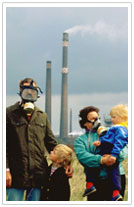
Coal-based energy generation causes 21,000 deaths, 24,000 hospitalizations, and 280,000 severe asthma attacks every year in the U.S.
After years of delays, the Environmental Protection Agency (EPA) has proposed limits on greenhouse gas (GHG) emissions from new power plants, formally called the New Source Performance Standard (NSPS). The rule caps carbon dioxide emissions at 1,000 pounds per megawatt of energy produced. This will likely bar the construction of new coal plants, as the carbon capture and sequestration technology required to comply with those limits is unproven and uneconomical.
However, the new rule excludes existing coal plants or any plants that receive approval in the next year. So while the rule implicitly encourages the development of new natural gas plants, which meet the new criteria, overall GHG emissions will not be significantly impacted.
Hydraulic fracturing for natural gas, or “fracking,” has also been on the EPA’s agenda. In response to complaints about health problems caused by carcinogenic methane and benzene emissions, the agency drafted the first-ever air quality standard regulations for natural gas and oil drilling. It would require use of pollution control equipment during the three to 10 days when a fracked gas well is vented to transition from drilling to production.
Though this appears promising, the EPA made major concessions by delaying enforcement for two years and allowing drillers to burn off methane, which releases smog-forming nitrogen oxides. The rule also updated existing emissions rules for natural gas processing plants, storage tanks, and pipelines.
Despite these new proposed regulations, fossil fuel plants will continue pumping out toxic air pollutants that endanger our health and wreak havoc on the environment. And until 2015, when the new fracking rule comes into effect, air emissions will proceed unabated and result in increased flaring.
As You Sow will continue to advocate for protecting our communities and the environment from the pollution inherent in coal- and fracking-based energy generation.
Source: Herve Donnezan / Age Fotostock











